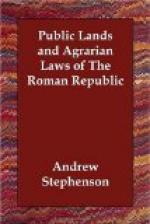[Footnote 4: Appian, De Bello Civile, I, 8.]
[Footnote 5: Livy VI, 35; See Momm., I, 382; Duruy, Hist. des Romains, II, 78.]
[Footnote 6: Livy, VI, 37.]
[Footnote 7: Livy, VI, 35: “creatique tribuni Caius Licinius et Lucius Sextius promulgavere leges adversus opes patriciorum et pro commodis plebis.”]
[Footnote 8: Ihne, I, 314.]
[Footnote 9: Livy, VI, 35: “Cuncta ingentia, et quae sine certamine obtineri non possent.”]
[Footnote 10: Livy, VI, 35.]
[Footnote 11: Livy, VI, 36.]
[Footnote 12: Livy, VI, 36. Fabius quoque tribunis militum, Stolonis socer, quarum legum auctor fuerat, earum sua.]
[Footnote 13: Livy, loc. cit.]
[Footnote 14: Appian, De Bell. Civ., I, 9.]
[Footnote 15: Momm., I, 240: “decemviri sacris faciundis.” Lange, loc. cit.]
[Footnote 16: Livy, VI, 38; Momm., loc. cit.]
[Footnote 17: Livy, VI, 38; Momm., loc. cit.]
[Footnote 18: Dion Cassius, Fragment, XXXIII, with Reimer’s note.]
[Footnote 19: Livy, VI, 42.]
[Footnote 20: Livy, VI, 42: et comitia consulum adversa nobilitate habita, quibus Lucius Sextius de plebe primus consul factus.]
[Footnote 21: Livy, loc. cit.]
[Footnote 22: Livy, VI, 42; Ovid, Faustus, I, 641, seq.:
“Furius antiquam populi superator
Hetrusci
Voverat et voti solverat ante fidem
Causa quod a patribus sumtis secesserat
annis
Vulgus; et ipsa suas Roma timebat
opes.”]
[Footnote 23: Momm., I, 389.]
[Footnote 24: Momm., I, 384.]
[Footnote 25: Arnold, Roman History, II, 35; Ihne, Essay on the Roman Constitution, p. 72. Ihne, Roman Hist., I, 332-334. Long, I, ch. XI. Lange, loc. cit.]
[Footnote 26: Livy, VII, 16: “Eodem anno Caius Licinius Stolo a Marco Popillio Laenate sua legi decem milibus aeris est damnatus, quod mille jugerum agri cum filio possideret, emancipandoque filium fraudem legi fecisset.” Appian, Bell. Civ., 1, 8; “[Greek: taen gaen es tous oikeious epi upokrisei dienemon.]”]
[Footnote 27: Momm., I, 389.]
[Footnote 28: Momm., I, 389, 390.]
[Footnote 29: Momm., I, 389, 390.]
SEC. VIII.—AGRARIAN MOVEMENTS BETWEEN 367 AND 133.
The first agrarian movement after the enactment of lex Licinia took place in the year 338, after the battle of Veseris in which the Latini and their allies were completely conquered. According to Livy,[1] the several peoples engaged in this rebellion were mulcted of a part of their land which was divided among the plebeians. Each plebeian receiving an allotment in the territory of the Latini had 2 jugera assigned him, while those in Privernum received 2-3/4,




